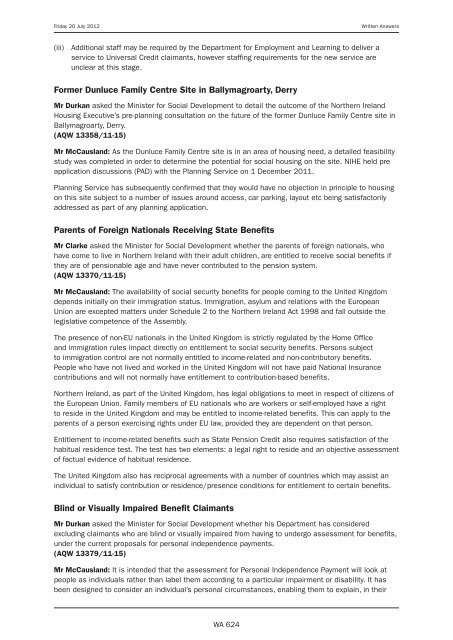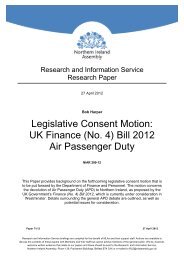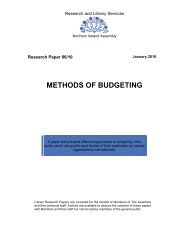Written Answers to Questions - Northern Ireland Assembly
Written Answers to Questions - Northern Ireland Assembly
Written Answers to Questions - Northern Ireland Assembly
Create successful ePaper yourself
Turn your PDF publications into a flip-book with our unique Google optimized e-Paper software.
Friday 20 July 2012 <strong>Written</strong> <strong>Answers</strong><br />
(iii) Additional staff may be required by the Department for Employment and Learning <strong>to</strong> deliver a<br />
service <strong>to</strong> Universal Credit claimants, however staffing requirements for the new service are<br />
unclear at this stage.<br />
Former Dunluce Family Centre Site in Ballymagroarty, Derry<br />
Mr Durkan asked the Minister for Social Development <strong>to</strong> detail the outcome of the <strong>Northern</strong> <strong>Ireland</strong><br />
Housing Executive’s pre-planning consultation on the future of the former Dunluce Family Centre site in<br />
Ballymagroarty, Derry.<br />
(AQW 13358/11-15)<br />
Mr McCausland: As the Dunluce Family Centre site is in an area of housing need, a detailed feasibility<br />
study was completed in order <strong>to</strong> determine the potential for social housing on the site. NIHE held pre<br />
application discussions (PAD) with the Planning Service on 1 December 2011.<br />
Planning Service has subsequently confirmed that they would have no objection in principle <strong>to</strong> housing<br />
on this site subject <strong>to</strong> a number of issues around access, car parking, layout etc being satisfac<strong>to</strong>rily<br />
addressed as part of any planning application.<br />
Parents of Foreign Nationals Receiving State Benefits<br />
Mr Clarke asked the Minister for Social Development whether the parents of foreign nationals, who<br />
have come <strong>to</strong> live in <strong>Northern</strong> <strong>Ireland</strong> with their adult children, are entitled <strong>to</strong> receive social benefits if<br />
they are of pensionable age and have never contributed <strong>to</strong> the pension system.<br />
(AQW 13370/11-15)<br />
Mr McCausland: The availability of social security benefits for people coming <strong>to</strong> the United Kingdom<br />
depends initially on their immigration status. Immigration, asylum and relations with the European<br />
Union are excepted matters under Schedule 2 <strong>to</strong> the <strong>Northern</strong> <strong>Ireland</strong> Act 1998 and fall outside the<br />
legislative competence of the <strong>Assembly</strong>.<br />
The presence of non-EU nationals in the United Kingdom is strictly regulated by the Home Office<br />
and immigration rules impact directly on entitlement <strong>to</strong> social security benefits. Persons subject<br />
<strong>to</strong> immigration control are not normally entitled <strong>to</strong> income-related and non-contribu<strong>to</strong>ry benefits.<br />
People who have not lived and worked in the United Kingdom will not have paid National Insurance<br />
contributions and will not normally have entitlement <strong>to</strong> contribution-based benefits.<br />
<strong>Northern</strong> <strong>Ireland</strong>, as part of the United Kingdom, has legal obligations <strong>to</strong> meet in respect of citizens of<br />
the European Union. Family members of EU nationals who are workers or self-employed have a right<br />
<strong>to</strong> reside in the United Kingdom and may be entitled <strong>to</strong> income-related benefits. This can apply <strong>to</strong> the<br />
parents of a person exercising rights under EU law, provided they are dependent on that person.<br />
Entitlement <strong>to</strong> income-related benefits such as State Pension Credit also requires satisfaction of the<br />
habitual residence test. The test has two elements: a legal right <strong>to</strong> reside and an objective assessment<br />
of factual evidence of habitual residence.<br />
The United Kingdom also has reciprocal agreements with a number of countries which may assist an<br />
individual <strong>to</strong> satisfy contribution or residence/presence conditions for entitlement <strong>to</strong> certain benefits.<br />
Blind or Visually Impaired Benefit Claimants<br />
Mr Durkan asked the Minister for Social Development whether his Department has considered<br />
excluding claimants who are blind or visually impaired from having <strong>to</strong> undergo assessment for benefits,<br />
under the current proposals for personal independence payments.<br />
(AQW 13379/11-15)<br />
Mr McCausland: It is intended that the assessment for Personal Independence Payment will look at<br />
people as individuals rather than label them according <strong>to</strong> a particular impairment or disability. It has<br />
been designed <strong>to</strong> consider an individual’s personal circumstances, enabling them <strong>to</strong> explain, in their<br />
WA 624






